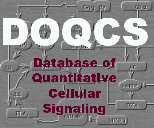
|
Enter a Search String | | Special character and space not allowed in the query term.
Search string should be at least 2 characters long. |
Molecule List for pathway CaMKII (Pathway Number 357) in Accession Ajay_Bhalla_2004_Feedback_Tuning (Accession Number 78) | Default ordering is done according to Pathway Number. Table headers can be used for changing the default ordering.
  arrow indicates that ordering is done according to ascending or descending order. arrow indicates that ordering is done according to ascending or descending order.
The entries are grouped according to Pathway Number and are alternately color coded using  and and  color. color. |
| |
Name | Accession
Type | Initial
Conc.
(uM) | Volume
(fL) | Buffered | Sum Total Of | | 1 | CaMKII | Network | 70 | 0 | No | - | | | Huge conc of CaMKII. In PSD it is 20-40% of protein, so we assume it is around 2.5% of protein in spine as a whole. This level is so high it is unlikely to matter much if we are off a bit. This comes to about 70 uM. | | 2 | CaMKII-CaM | Network | 0 | 0 | No | - | | 3 | CaMKII-thr286*-C
aM | Network | 0 | 0 | No | - | | | From Hanson and Schulman, the thr286 is responsible for autonomous activation of CaMKII. | | 4 | CaMKII*** | Network | 0 | 0 | No | - | | | From Hanson and Schulman, the CaMKII does a lot of autophosphorylation just after the CaM is released. This prevents further CaM binding and renders the enzyme quite independent of Ca. | | 5 | CaMKII-thr286 | Network | 0 | 0 | No | - | | | I am not sure if we need to endow this one with a lot of enzs. It is likely to be a short-lived intermediate, since it will be phosphorylated further as soon as the CAM falls off. | | 6 | CaMK-thr306 | Network | 0 | 0 | No | - | | | This forms due to basal autophosphorylation, but I think it has to be considered as a pathway even if some CaM is floating around. In either case it will tend to block further binding of CaM, and will not display any enzyme activity. See Hanson and Schulman JBC 267:24 pp17216-17224 1992 | | 7 | tot_CaM_CaMKII | Network | 0 | 0 | No | CaMKII-CaM
CaMKII-thr286*-C
aM
| | 8 | tot_autonomous_
CaMKII | Network | 0 | 0 | No | CaMKII-thr286
CaMKII***
|
| Database compilation and code copyright (C) 2022, Upinder S. Bhalla and NCBS/TIFR
This Copyright is applied to ensure that the contents of this database remain freely available. Please see FAQ for details. |
|
